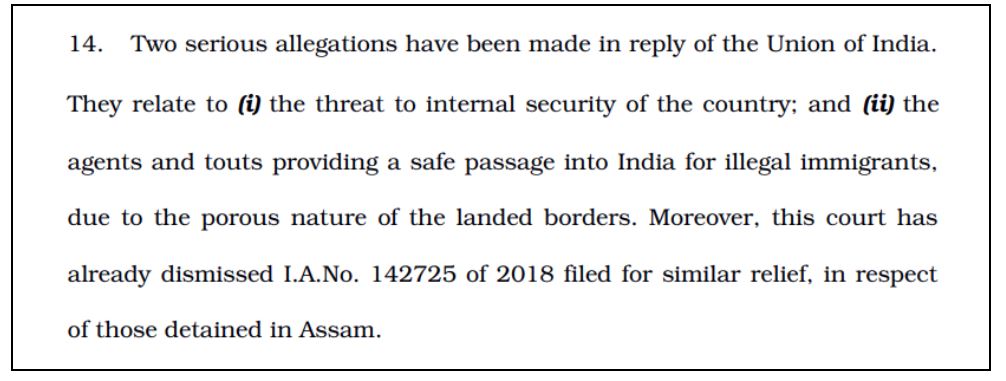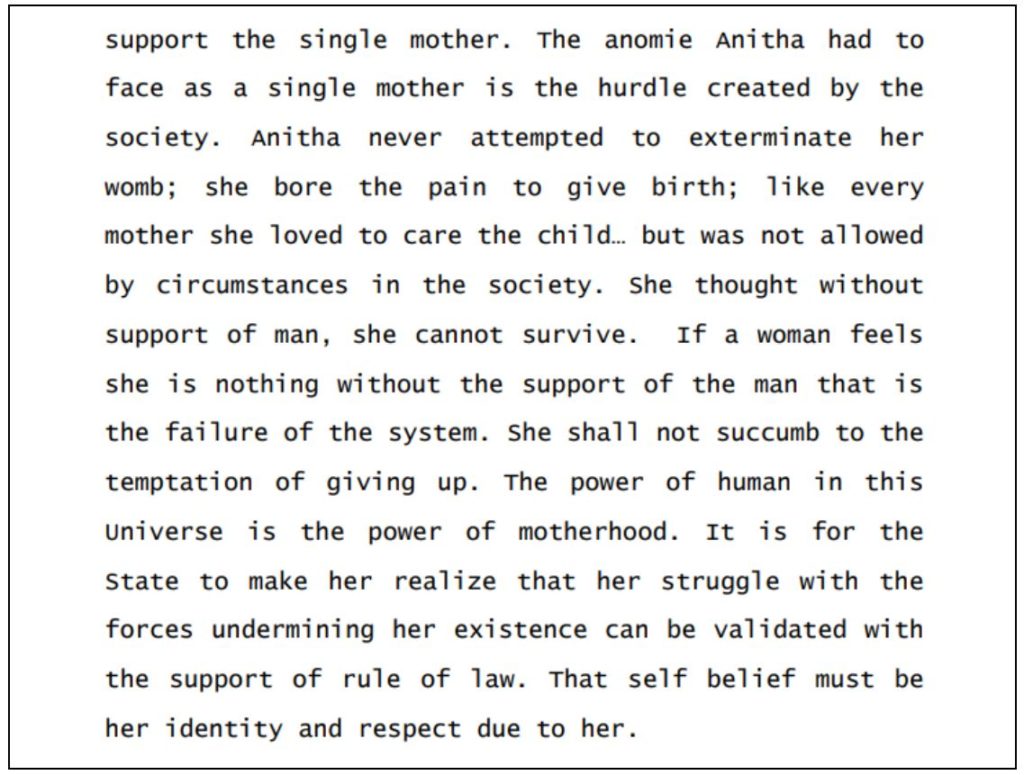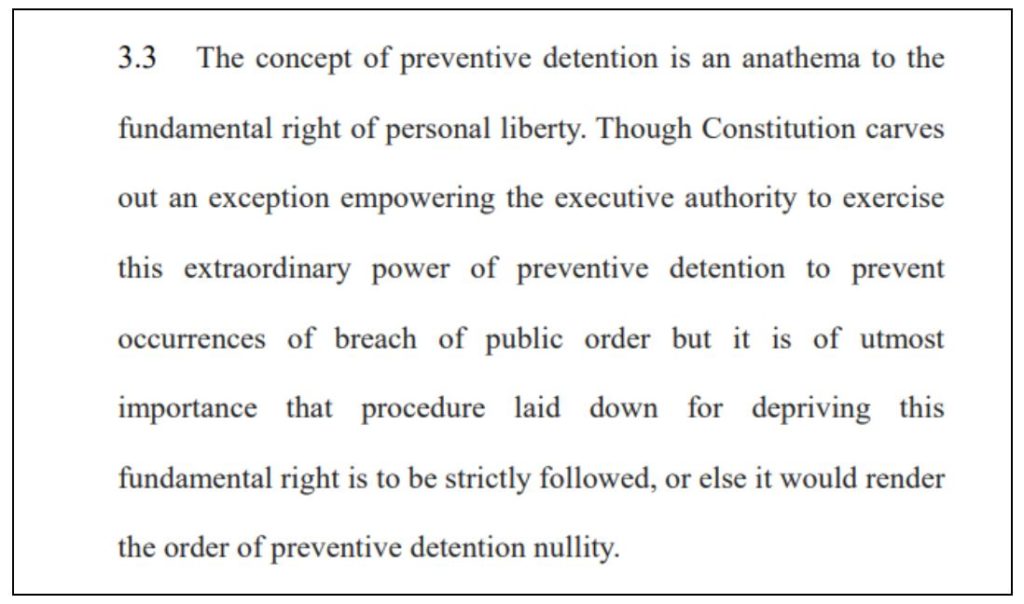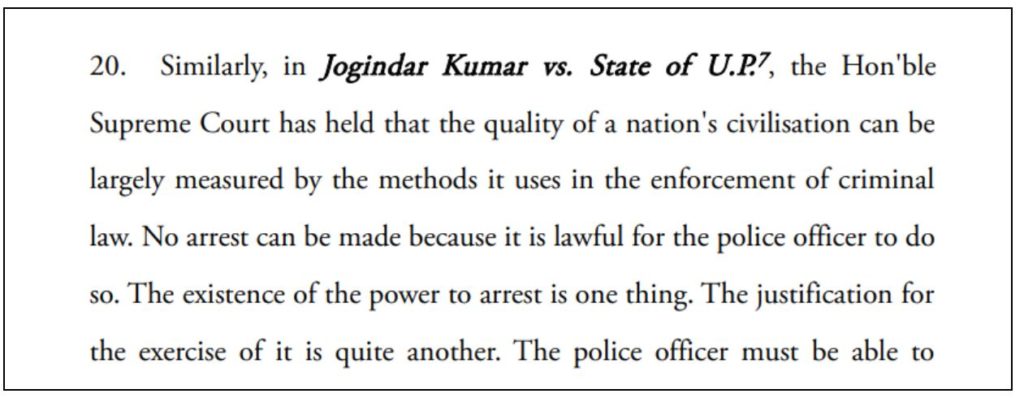In this roundup of the important court judgments, we look at directions about the legality of deportation of Rohingyas, rights of a couple in a live-in relationship, preventive detention, and freedom of speech.
Supreme Court: Rohingyas in Jammu to be deported with procedure prescribed.
In the case Mohammad Salimullah Vs. Union of India, the apex court held that the Rohingyas can be deported from Jammu following the procedure prescribed for deportation.
The court was hearing a plea to stop the deportation of Rohingya refugees detained in Jammu. The Rohingya community has faced persecution in Myanmar. In the last few years, before the latest crisis, thousands of Rohingya made perilous journeys out of Myanmar to escape communal violence or alleged abuses by the security forces. The military coup, which has replaced the elected government, poses an imminent threat to the lives of the Rohingya community.
The counsel for the petitioner submitted that more than there are about 6,500 Rohingyas refugees in Jammu and that they have been illegally detained and jailed, according to reports that appeared in The Wire, The Hindu, The Indian Express, and The Guardian. The main contentions of the petitioners were:
- The principle of non-refoulment is part of the right guaranteed under Article 21.
- The rights guaranteed under Articles 14 and 21 are available even to non-citizens.
- Although India is not a signatory to the UN’s Convention on Status of Refugees 1951, it is a party to the Universal Declaration of Human Rights 1966 and Convention on the Rights of the Child 1992, and therefore non-refoulment is a binding obligation. Further, India is a signatory to the Protection of All Persons against Enforced Disappearances, Convention against Protection of All Persons, Convention against Torture and Other Cruel and Inhuman or Degrading Treatment or Punishment.
The Union of India replied in the following terms:
- A similar application challenging the deportation of Rohingyas from Assam was dismissed by the Supreme Court in October 2018.
- The persons for whose protection against deportation the present application has been filed, are foreigners within the meaning of Section 2(a) of the Foreigners Act 1946. Section 3 of the Foreigners Act empowers the Central Government to issue orders for prohibiting, regulating, or restricting the entry of foreigners into India or their departure. The right of the government to expel a foreigner is unlimited and absolute.
- India is not a signatory to the UN’s Convention on the Status of Refugees 1951 or the Protocol of the year 1967. The principle of non-refoulment is applicable only to “contracting States”.
- Since India has open/porous borders with many countries, there is a continuous threat of an influx of illegal immigrants. Such an influx has posed serious national security ramifications.
- There is organised and a well-orchestrated influx of illegal immigrants through various agents and touts for monetary considerations.
- Though the rights under Article 14 and 21 may be available to non-citizens, the fundamental right to reside and settle under Article 19(1)(e) is available only to citizens.
Upon examining all considerations, the bench of Chief Justice of India SA Bobde, AS Bopanna, and V. Ramasubramanian observed that the Rohingyas in Jammu shall not be deported unless the procedure prescribed for such deportation is followed.

The court took serious note of the allegations of internal security threats and agents providing safe passage to illegal immigrants, as submitted by the Central Government. The apex court reasoned that it is not possible to grant any interim relief with respect to the petition and ordered that the Rohingyas can be deported following the procedure.
Kerala HC: Child born in live-in relationship to be construed as child born to married couple.
In a significant order, the Kerala high court held that a child born in a live-in relationship would be construed as a child born to a married couple. While recognising a woman’s decisional autonomy to acknowledge her biological father, the high court directed restoration of the surrendered child to the live-in couple.
The case pertains to a couple, John & Anitha, who started a live-in relationship in 2018. Anitha become pregnant and gave birth in February 2020. When John broke the relationship or remained elusive, Anitha felt isolated and approached the Child Welfare Committee and handed over the child, and executed a deed of surrender in June 2020. On completion of the procedure, the Committee declared that the child is legally free for adoption in the manner contemplated under Section 38 of the Juvenile Justice (Care and Protection of Children) Act, 2015 (JJ Act). The child thereafter was given in adoption to a couple by the order of the Family Court, Ernakulam, in February 2021.
The couple got back together and approached the high court with a writ of habeas in February 2021. Notice was issued to the State and the Child Welfare Committee. The Committee submitted before the Court that the child had already been given in adoption.
The central issue that the high court was dealing with was whether the law differentiates between the unwed and legally wed couples in matters or relationships not connected with marriage, as a social institution? More specifically, in the context of juvenile justice, does the law differentiate unwed couples and legally wed couples to recognize biological parents. There are two circumstances wherein a child needs care and protection from the State/Committee: (i) Orphan or abandoned child (ii) Surrendered child. A ‘Surrendered child’ needs further classification under the law: (i) Surrendered by a married couple (ii) Surrendered by an unmarried mother. The bench was contemplating the question – whether a married couple includes a couple in a live-in relationship or not for the purpose of law related to surrender? Under Regulation 7(5) of the Adoption Regulations, if a child born to a married couple is surrendered, both parents must sign a deed of surrender.
The technical issue in the present case is that the procedure clearly distinguishes surrender by an unmarried mother from a married couple. The entire legal issue is surmounted on the legality of the surrender by Anitha, unilaterally. Therefore, if the surrender is legally valid, the entire challenge, in this case, comes to an end. After the perusal of records, the court concluded that the Committee followed the procedure for surrendering the child applicable to an unmarried mother.
In the present case, the court notes that the birth certificate shows the name of the father, mother, and child. A birth certificate is a crucial document for the public authority to verify that the child is born to a married couple or not. Once it is found that the child is born to a couple, for all practical purposes of the JJ Act, an inquiry must be initiated as though the child belonged to a married couple.
Since the surrender is by one parent and the whereabouts of the other parent are not known, the child has to be treated as an abandoned child. Admittedly, the procedure applicable for an abandoned child was not followed by the Committee, instead, they followed the procedure relevant to an unwed mother alone. Hence, the declaration and issuance of a certificate under Section 38 of the JJ Act that the child is legally free for adoption stand to be legally unsustainable.
The judgment concluded that since the entire proceedings leading to Section 38 fall, consequently, the adoption becomes illegal. The judgement further highlights the plight of a single mother who faces financial, social, and emotional challenges and deems it to be a failure of the system. The court also took cognizance of chat messages between Anitha and the Social Worker, which depict the vulnerable state of Anitha. She constantly kept in touch with the Child Care Institution where the child was put up to keep track of the child’s well-being. The judgement takes note of her desperation and the plight of her suffering in being a single mother who was not a legally wedded relationship.

In view of the willingness of the biological father to take care of the child, the court directed the Committee to consider his rights to claim for restoration under Sections 37 and 40 of the JJ Act. The Committee was directed to take necessary steps for restoration in accordance with law within a period of one month.
Madhya Pradesh HC: Directs State Government to issue guidelines to all District Magistrates to strictly adhere to the provisions of National Security Act
In the case Anshul Jain vs. State of Madhya Pradesh, the high court held that due to procedural lapses in following due process of law, the orders of preventive detention which may have been passed on justified grounds suffers annulment.
The court was hearing a plea filed against an order of preventive detention passed by District Magistrate, Guna for directing detention of petitioner for a period of three months. The grounds for detention were based on the seizure of certain misbranded and adulterated items from the premises of the petitioner.
The counsel for the petitioner argued that the offence registered after the said raid did not lead to a situation that may give rise to prejudice to public order. The petitioner also submitted that the food items were not found to be unsafe for human consumption and highlighted the failure of the State to demonstrate actual communication of the order of detention and its grounds to the Central Govt. thereby raising ground of Secs. 3(2),(4), and 3(5) of the National Security Act (NSA).
The court notes that the State Government did not bring any material to show that after forwarding the approval order along with grounds to the Central Government, the same was actually received by the Central Government or not. The Court further observed that the order of preventive detention was passed on 18 December 2020, whereby District Magistrate Guna took 3 long days’ time to forward the case to the State government. for approval.
The judgement held that in the absence of any satisfactory explanation, the order of preventive detention stands vitiated.

The judgement highlights that the court has come across various cases in the recent past where on account of procedural lapses in following due process of law, the order of preventive detention which may have been passed on justified grounds suffers annulment. Therefore, the court found it essential that the State issues guidelines to all District Magistrates so that timeline provided in following due process of law and other provisions of NSA are strictly followed. The Court further said that it is also seen that original record produced from the office of concerned District Magistrate ordinarily does not contain the following materials: –
- The exact date of forwarding with proof of dispatch by the District Magistrate to the State for approval.
- The exact date with material to show receipt of the order of preventive detention by the State.
- The exact date of dispatch along with the material of forwarding the order of approval by the State to the Central Government.
- The exact date of receipt by the Central Govt. of the order of approval of the State Govt. along with the ground.
- When an order of preventive detention is passed by District Magistrate/State against a person already in custody, then the order of preventive detention does not reveal in specific words that the competent authority was conscious of this fact and yet for reasons to be recorded in the order deems it necessary to preventively detain the person concerned.
The judgement also stressed that the satisfaction of competent authority is to reflect from the order of preventive detention or else it may not stand the test of law.
Goa HC: Non-deliberate insult to religion without intention to hurt religious feelings not an offence under Section 295-A.
In the case Sudheer Rikhari v. State of Goa & Ors., the high court held that Section 295-A only punishes aggravated form of insult to religion when perpetrated with the deliberate and malicious intention of outraging the religious feelings of that class.
The court was hearing a petition for quashing of FIR filed against members of an art-rock project at Panaji Police Station alleging that they have committed an offense under section 295-A and section 34 of the Indian Penal Code (IPC). Section 295-A punishes deliberate and malicious acts, intended to outrage religious feelings of any class by insulting its religion or religious beliefs. After lodging the FIR, the petitioners were called to the police station “to issue an apology” and were placed under arrest on 18 December 2020. The arrested petitioners later secured bail and other petitioners had to secure anticipatory bail to avoid physical arrest.
The Petitioners are members of an art-rock live performance project known as “Dastaan LIVE”. The Petitioners claim that the said band is driven by several influential poets and writers from Faiz Ahmed Faiz to Baba Nagarjuna, to Sahir Ludhianvi to Nazeer Akbarabadi, and has composed their lyrics using progressive rock and shades of folk music to create an audio-visual live performance. One such song performed by the Petitioners’ band was the “Mantra Kavita” by Vaidyanath Misra (widely known as Baba Nagarjun), which was originally composed in the year 1969. The petitioners also placed on record the entire text of the “Mantra Kavita” by Shri Vaidyanath Misra accompanied by a certificate under section 65-B of the Evidence Act.
The petitioners pleaded that their band was only performing their own musical adaptation of the poem composed by Shri Vaidyanath Misra and even the lyrics were not modified by them, in the least. Various artists have given their own musical adaptation to this composition. The Petitioners also argued that the alacrity and the undue haste in registering the FIR give reason to believe that it was driven by political interest with malicious intent to damage the band’s reputation and to curb free speech and artistic intent/creative capital.
The Public Prosecutor submitted that “OM” is quite sacred to the Hindus and if the same is recited in a negative narrative or clubbed with the words or phrases “Ullu ka pattha”, then, the same amounts to insulting religion and religious beliefs. He argued that the petitions may be dismissed with an opportunity for the petitioners to face trial and prove their innocence.
At the onset, the court observed that the police authorities cannot call citizens to the Police Station and demand apologies of this nature. The judgement held that there was no justification whatsoever for arresting the petitioners, who are members of a band and who have been making such presentations all over the Country, unhindered and unmolested. The judgement notes that based on a frivolous complaint, some of the petitioners, who were only members of a band were incarcerated or forced to seek anticipatory bail.

The judgement emphasises that no arrest can be made routinely on a mere allegation of commission of an offense made against a person, except in heinous crimes. There has to be some reasonable justification, in the opinion of the officer effecting the arrest, that such arrest is necessary and justified.
In conclusion, the court quashed the FIR and held that the police authorities were neither justified in registering the FIR nor arresting any of the petitioners. After pursuing the lyrics of the said poem, the judgement clarifies that allegations in the FIR, even if accepted in their entirety, do not even remotely point out the ingredients of Section 295-A of IPC. To simply allege that “OM” which is a symbol of the complainant’s faith “in a negative narrative” or “abusing people chanting the OM and followers to Hindu stream as Ullu ke Patta” is by no means sufficient to spell out the ingredients of Section 295-A of the IPC. Section 295-A only punishes aggravated form of insult to religion when perpetrated with the deliberate and malicious intention of outraging the religious feelings of that class.
Featured Image: Important court judgments


